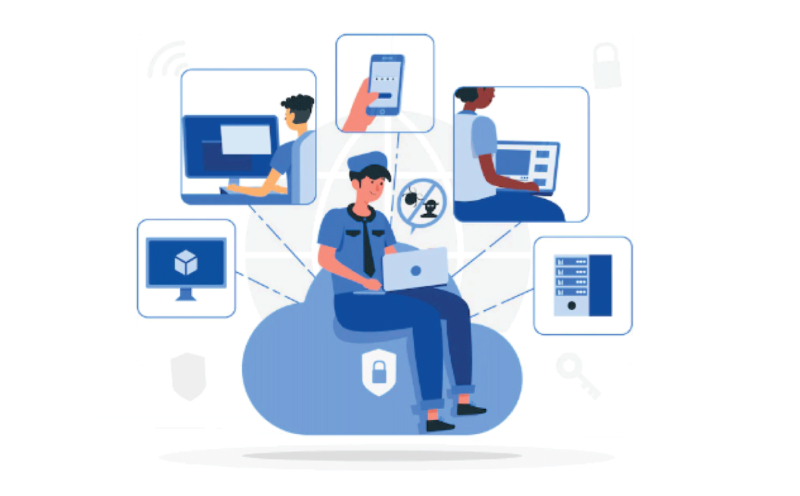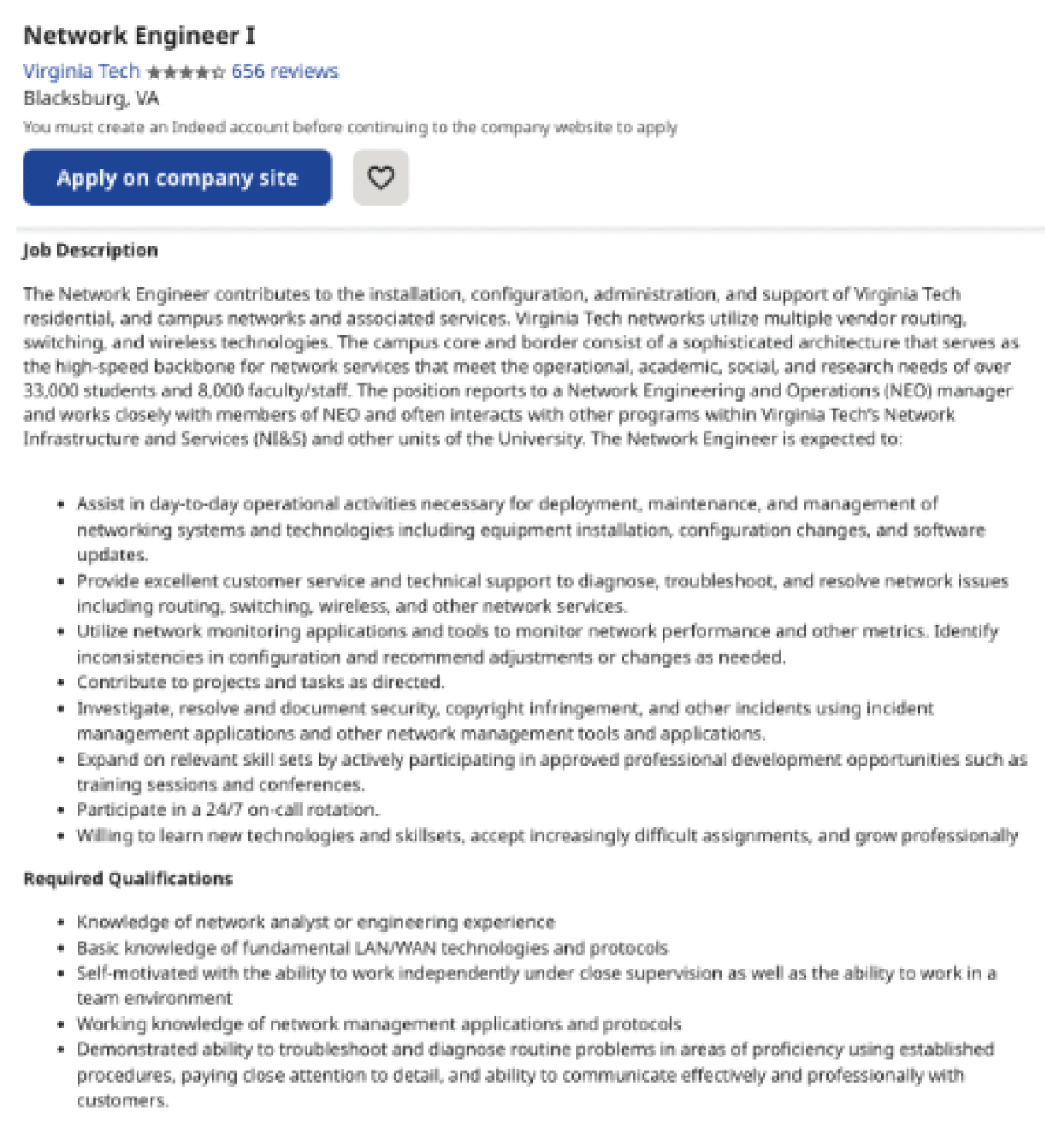Highest Paying Cybersecurity Jobs in 2023

In this article
It used to be that cybersecurity experts functioned as generalists, overseeing and protecting an organization’s entire cybersecurity infrastructure. But with the explosion of cyberattacks and the corresponding growth in the cybersecurity industry, that’s all changed. Now, cybersecurity professionals often have a niche or specialty, with some roles offering more potential for growth.
With varying requirements for different positions, not all cybersecurity jobs are equally lucrative. And if you’re trying to get your foot in the door, it can be difficult to parse which jobs will offer the highest salaries.
That’s why we’ve compiled this list of the highest-paying cybersecurity jobs. Below, we’ll detail everything you need to know, including the roles and responsibilities, for cybersecurity’s most lucrative positions. Ready? Then let’s get started.
Do Cybersecurity Jobs Pay Well?
Yes. Cybersecurity is a lucrative field. Entry-level jobs begin at $50K, and as you gain experience, you can reach six figures quickly. You don’t need a degree, and some knowledge in IT and other transferable organizational skills can help you land a well-paying cybersecurity job.
Top 10 Highest Paying Cybersecurity Jobs
Find the right fit for yourself among the top 10 highest-paying cybersecurity jobs listed below:
Chief Information Security Officer (CISO)
A CISO needs to have deep knowledge of information security management systems. They are the face of the organization’s cybersecurity efforts, so soft skills like communication and public speaking are critical.
Roles and Responsibilities
A Chief Information Security Officer:
- Handles the organization’s cybersecurity architectures
- Heads the cybersecurity initiatives in the company
- Oversees the execution of data protection and breach detection solutions
Average Salary
Depending on the size and location of the organization, a CISO can earn anywhere between $200,000 – $300,000. CISOs for small companies will earn closer to $100,000.

General Requirements
A CISO position requires prior experience in security leadership or administration, along with familiarity with industry frameworks and tools. Since the CISO is the lead advocate for cybersecurity concerns for an organization, they need strong leadership skills and a well-rounded technical background.
Cybersecurity Director
A cybersecurity director strategizes the organization’s information security goals and oversees the daily operations of cybersecurity departments.
Roles and Responsibilities
A cybersecurity director or manager:
- Organizes threat assessments
- Ensures that the relevant teams can handle security incidents
- Manages daily duties related to cybersecurity initiatives
- Acts as the point of contact for other non-technical teams
Average Salary
A cybersecurity director’s average salary range is $100,00-$200,000. In smaller companies, the salary may be closer to $75,000.

General Requirements
A cybersecurity director has prior experience in management roles and technical abilities for incident response. They must have IT security experience and an understanding of information security modules. Those with managerial experience, even if in an unrelated field, will be at an advantage.
Lead Software Security Engineer
This job role is an intersection between software engineering and cybersecurity. A lead software security engineer is responsible for developing and executing technology solutions that meet business needs without compromising security.
Roles and Responsibilities
They perform security reviews of all products and assist the Director of Cybersecurity. They should be able to fix security bugs and review codes.
They are responsible for:
- Building and implementing network security solutions
- Performing security analysis to identify gaps
- Establishing security controls and acting as a point of contact for the cybersecurity and engineering departments
Average Salary
A lead software cybersecurity engineer’s average salary can be between $120,000 and $160,000.

Source: Salary
General Requirements
A lead software security engineer must have experience in security architecture, software development, and risk management. They should have a strong foundation in programming languages and security tools.
Information Systems Security Manager
The organization’s security systems architect is the Information Systems Security Manager (ISSM). They are also sometimes called cybersecurity administrators. They supervise security violations and keep track of data recovery investigations.
Roles and Responsibilities
An ISSM is responsible for:
- Drafting and implementing information security policies and procedures
- Conducting investigations related to breaches and violations within the information security framework
- Providing advice related to procedural information security systems to other teams
Average Salary
Their annual salary falls in the $125,000-$155,000 range. Smaller companies pay around $80,000.

General Requirements
An ISSM should have an in-depth knowledge of data loss protocols. Security certifications such as Certified Information Systems Security Professional (CISSP), Certified Information Systems Auditor (CISA), and Certified Information Security Manager (CISM) are vital. An advanced level of experience with server systems and different kinds of OS is also necessary for an ISSM.
Security Architect
A security architect is responsible for maintaining and improving the cybersecurity architectures of the organization.
Roles and Responsibilities
A security architect is responsible for:
- Performing security assessments
- Defining best security practices for the organization
- Providing technical advice related to security design and configurations
Average Salary
A security architect earns around $125,000-$155,000.

Source: Salary
General Requirements
A security architect must have an advanced understanding of programming languages and the relevant technology. These could be AI tools or cloud platforms if the organization uses them.
Get To Know Other Cybersecurity Students
Ed Burke
Cyber Security Career Track Student at Springboard
Dylan Wood
Cybersecurity Career Track Student at Springboard
Dipen Patel
Cybersecurity Analyst at Accenture
Cloud Engineer
Cloud engineers who double as software developers create secure cloud-based applications and make recommendations for cloud-specific security measures.
Roles and Responsibilities
A cloud engineer is responsible for:
- Handling all security tasks related to cloud environments
- Building software and databases for cloud technologies
- Manage software and hardware related to cloud-based services
Average Salary
Like a security architect, a cloud engineer earns within the $60,000-$125,000 range. This depends on their level of experience with various cloud platforms like AWS (Amazon) and GCP (Google).

General Requirements
A cloud engineer is expected to have a deep understanding of programming languages like Java, Python, and Ruby. They must also be proficient with operating systems like Linux. They must also be aware of how cloud providers function.
Cybersecurity Sales Engineer
A cybersecurity sales engineer oversees the technology advisory aspect of product sales. They help the sales team understand the technical aspects of the product so that they are confident with answering any concerns or queries that customers might have.
Roles and Responsibilities
A cybersecurity sales engineer is responsible for:
- Answering technical questions from prospects
- Performing the technical parts of the sales cycle, such as creating product demos and managing processes like formulating proof of concept
- Ensuring that the sales team understands the technical facets of the product
Average Salary
A cybersecurity sales engineer can earn around $50,000-$165,000. Depending on their sales background, the average salary will be higher due to commissions. Do you have a knack for sales and plenty of coding experience? Then this particular career in cybersecurity will be the perfect fit.

General Requirements
A cybersecurity sales engineer should know security technologies and solutions well. Only then can they sell them and help customers assess which products match their needs. Prior job experience in working with these technologies is critical.
Information Systems Security Engineer (ISSE)
An Information Systems Security Engineer, sometimes also called an Information Security Analyst, works with the information security team to protect computer systems and networks in the organization. They are also part of network forensic investigations.
Roles and Responsibilities
An Information Systems Security Engineer:
- Upgrades the security on the devices of the organization’s clients
- Strengthens firewalls within the IT framework
- Handles post-breach resuscitation of the security systems
- Investigate impacts of cybersecurity threats on network systems
Average Salary
An ISSE earns around $125,000, depending on their credentials and experience level.

Source: Salary
General Requirements
They should have expertise in collecting and synthesizing data related to hacks. The findings need to be presented through reports and whitepapers. They must have industry certifications such as the CISSP, GSEC, OSCP, etc. This job can be remote.
Certified Ethical Hacker/Penetration Tester
Penetration testers or ethical hackers (also known as bug bounty hunters) simulate breaches on security systems to identify vulnerabilities. They are some of the most sought-after experts in the field. Their job is to do trial runs of security breaches and unauthorized access to expose flaws and avoid future attacks.
Source: Bank of America
Roles and Responsibilities
An ethical hacker is responsible for:
- Executing breach simulations to understand how robust the organization’s security systems are
- Researching security protocols
- Creating penetration scripts and tests
- Providing advice related to risk management based on penetration tests
Average Salary
Tesla had gone viral for stating that it pays freelance hackers over $500K. The average in-house salary for certified ethical hackers is closer to $100,000.

Source: Salary
General Requirements
As bug bounty hunters, they must know how to compromise security protocols. Then, other cybersecurity departments can improve them with a robust security strategy. Use these free sources to learn ethical hacking from scratch.
Network Security Engineer
A network security engineer oversees an organization’s configuration and maintenance of network systems. They are the expert anyone in the organization can approach for troubleshooting network performance-related issues.

Source: Indeed
Roles and Responsibilities
A network security engineer:
- Troubleshoots network issues
- Helps with the general maintenance of network systems
Some organizations may ask network security engineers to create incident response programs. These are usually based on the blueprints provided by a network security architect.
Average Salary
The median salary of a network security engineer is around $80,000. Their salary range is slightly lower, with most companies not paying more than $105,000.

Source: Salary
General Requirements
Employers expect network security engineers to have basic knowledge of LAN/WAN technologies. They must also have advanced network management expertise. The ability to execute this knowledge in a customer-facing role is valuable.
Skills Needed To Be Successful in Cybersecurity
Getting the requisite cybersecurity skills can be overwhelming. Here’s a brief glimpse of some of the technical skills and soft skills you will need as a cybersecurity expert:
Technical Skills
- Networking and system administration. You must display adequate knowledge related to daily duties such as maintaining network security and computer systems.
- Knowledge of operating systems. An operating system is an interface between the system and the user. As a cybersecurity expert, you must know about all the major operating systems, how they work, etc. With this knowledge, you can contextualize all your other specific expertise.
- Programming languages. Knowing programming languages like SQL, C or Python is critical. These are what hackers and threat actors use to infiltrate security systems.
- Cloud security. Most companies and businesses have embraced the cloud for their workflows. You will be remiss if you are unaware of cloud security protocols and technologies.
- AI. Working knowledge of artificial intelligence systems can help you rise through the ranks of jobs in cybersecurity. Knowing how to operate machine learning models for cybersecurity threats can make your work more impactful.
- Risk analysis. As a cybersecurity expert, you will benefit from knowing how risk assessments work and all the steps involved.
- Information and Event Management (IEM). This involves data aggregation to identify cybersecurity threats in real-time. An organization can avoid unnecessary downtime with IEM. It helps streamline the working of other cybersecurity teams. They can access a central database that tracks new and recurring threats.
Soft Skills
- Creative thinking. As threat actors get more creative in their ways, so should you. There’s a reason why this penetration tester was able to find a vulnerability within a data center through a bathroom corridor. They were creative in their approach and mindful of how hackers may exploit seemingly safe systems.
- Problem-solving. We don’t have to tell you that you will be putting out many fires as a cybersecurity expert. You will need some essential skills related to problem-solving. These include identifying the problem, developing multiple solutions, and executing the most viable one.
Source: Transport Futures Institute
- Patience. You may feel overwhelmed when your organization has undergone a significant breach. Every minute will cost the organization money, reputation, and clients. The patience to step back from the chaos to take actionable decisions is vital.
- Learning aptitude. Cyberspace is constantly evolving. The learning curve will be steep. An aptitude for learning and unlearning will be instrumental to your growth in the industry.
- Analytical skills. The highest paying cybersecurity jobs need you to anticipate threats and analyze lots of data or ideate strategies.
- Good communication. It’s a myth that IT jobs like cybersecurity do not need interaction or communication skills. You may have to break down complex jargon such as these common cybersecurity terms into digestible language. You will also need excellent presentation skills (say, if you are an ethical hacker who conducted an exercise).
Factors That Determine Your Salary in Cybersecurity
Experience
You can learn cybersecurity on your own with suitable courses and some experimentation. These are sufficient to break into the field as junior cybersecurity analysts. From that point onwards, your experience level with different kinds of cybersecurity projects and project management skills will determine your average salary. You don’t need a graduate degree in cybersecurity.
Specialization and Technical Ability
Specialists earn more than generalists in this field. Once you pick an area, keep sharpening your technical abilities within it to unlock a higher salary using these free cybersecurity resources.
Suppose you have managed to do specific courses, such as our Cybersecurity Bootcamp. Then, you will be able to display a higher understanding of technical knowledge. You can easily apply to cybersecurity entry-level jobs or even aim for those coveted mid-level job titles on our list.
Geographical Location
Areas like Silicon Valley will have a higher demand since that’s where the tech industries are located.
Company Sector
Industries dealing with personal information tend to have more cybersecurity needs. The more prominent players in the finance and legal industry also have heavy cybersecurity requirements.
Demand for Your Skillset
Stay abreast of the evolving postings and cybersecurity roles. Upskill according to the marketability of these skills to negotiate high salaries.
Certifications
Obtaining advanced certifications will help elevate your positioning during cybersecurity salary negotiations. You can choose from many cybersecurity certifications, such as HCISPP, CISM, CEH, and so on, depending on the roles you want to apply to.
How To Choose the Right Cybersecurity Job
Interest and Skills
Gauge your skillsets and knowledge using these cybersecurity job interview questions. Identify your areas of interest and then find the highest-paying cybersecurity in those areas rather than the other way round.
Industry You Want To Work In
If there are particular industries you have prior job experience in, go for those. Try to apply for jobs in cybersecurity within industries you are familiar with to ensure maximum job security through intersectional knowledge.
Location
As mentioned earlier, some locations have a higher demand for cybersecurity experts. The average cybersecurity salary jump cannot be done without job-switching. Consider these areas as your primary targets so that you have options.
Company Culture
Always research the company’s employee policies. For example – Their workplace culture, attitude towards sabbaticals, and mental health breaks. These should match your needs.
FAQs About the High-Paying Cybersecurity Jobs
Still have questions? We’ve got you covered!
Can You Make $200K in Cybersecurity?
Yes! There are quite a few careers in cybersecurity where you can make more than $200k. Freelancing and making your way up to a cybersecurity consultant job can help you reach this income target sooner.
Which Cybersecurity Field Is the Best?
The cybersecurity career path that is best for you depends primarily on your skills and interests. Keep experimenting, even if it means settling for a lower salary initially.
What Kind of Cybersecurity Jobs Can You Do Remotely?
Cybersecurity job openings for penetration testing, source code review, SIEM analysis, and vulnerability assessments are a few examples. Any job that doesn’t require physical access to the company’s IT infrastructure can be remote.
Physical penetration tests and short-range network security testing will need your physical presence.
Which Country Has the Highest Demand for Cybersecurity Professionals?
Surveys show that Singapore has the highest demand for cybersecurity analysts and experts. In the United States, Washington DC is the most popular city for a career in the cybersecurity industry.
What Are the Top-Paying Cybersecurity Companies?
In the current job market, cybersecurity companies like CrowdStrike, Splunk, Palo Alto, and ZScaler pay high salaries. Security consultancy firms like FireEye and Mandiant are top-paying companies too.
Since you’re here…
Breaking into cybersecurity doesn’t take a Trojan Horse. Our Cybersecurity Bootcamp lasts just six months, and we’re the only program promising a job after graduation. Since there’s an urgent need in this field, we’re beaming out tons of freebies to entice you. Try our free cybersecurity learning path and this free course on cybersecurity certifications. Join in—there are plenty of jobs to go around!







